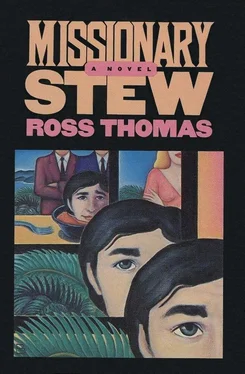Ross Thomas - Missionary Stew
Здесь есть возможность читать онлайн «Ross Thomas - Missionary Stew» весь текст электронной книги совершенно бесплатно (целиком полную версию без сокращений). В некоторых случаях можно слушать аудио, скачать через торрент в формате fb2 и присутствует краткое содержание. Город: New York, Год выпуска: 1983, ISBN: 1983, Издательство: Simon & Schuster, Жанр: Политический детектив, на английском языке. Описание произведения, (предисловие) а так же отзывы посетителей доступны на портале библиотеки ЛибКат.
- Название:Missionary Stew
- Автор:
- Издательство:Simon & Schuster
- Жанр:
- Год:1983
- Город:New York
- ISBN:978-0-671-49363-9
- Рейтинг книги:3 / 5. Голосов: 1
-
Избранное:Добавить в избранное
- Отзывы:
-
Ваша оценка:
- 60
- 1
- 2
- 3
- 4
- 5
Missionary Stew: краткое содержание, описание и аннотация
Предлагаем к чтению аннотацию, описание, краткое содержание или предисловие (зависит от того, что написал сам автор книги «Missionary Stew»). Если вы не нашли необходимую информацию о книге — напишите в комментариях, мы постараемся отыскать её.
Missionary Stew — читать онлайн бесплатно полную книгу (весь текст) целиком
Ниже представлен текст книги, разбитый по страницам. Система сохранения места последней прочитанной страницы, позволяет с удобством читать онлайн бесплатно книгу «Missionary Stew», без необходимости каждый раз заново искать на чём Вы остановились. Поставьте закладку, и сможете в любой момент перейти на страницу, на которой закончили чтение.
Интервал:
Закладка:
She examined her glass. “I remember these. Pimento cheese used to come in them. The Keatses always drank out of these and jelly glasses. Back when we were poor. Are you poor?”
“Extremely,” Citron said.
“What’d you do — before you got poor?” she said. “That’s my personal question.”
“I wrote and traveled.”
“You mean you were a travel writer? What’s doing in Omaha? Beautiful, unspoiled Belize. Tierra del Fuego on twenty a day. Stuff like that?”
“I guess I was really more of a writing traveler.”
“What’s the difference?”
“Well, I’d travel to someplace where not too many people go, live there awhile, maybe six months, sometimes longer, and then write about what it was like.”
“Is that what you’re doing here — in Malibu?”
Citron shook his head. “No.”
“What happened?”
“I think I ran out of places.”
“How long’ve you known the landlady?”
“Craigie Grey? Not long.”
“How long’s not long?”
“About five hours.”
“You’re right. That’s not long.”
Velveeta Keats finished her wine, put the glass down, and cupped her face in her palms. “I was married to a Cuban for three years.”
Citron waited for the rest of the tale. When there was nothing but silence for almost fifteen seconds, he said, “Well. A Cuban.”
“His family used to own all the milk in Cuba.”
“Before Castro.”
“Uh-huh. I don’t know how anyone could own all the milk in Cuba, but that’s what he always said. When I married him, he was in the dope business. That’s really why I married him, so the Keatses and the Manerases could combine operations. It worked out okay. Sort of, I reckon. For a while. You ever been married?”
“No.”
“Why not?”
“The usual reasons.”
“Name two.”
Citron thought for a moment. “Well, one died and the other one said no thanks.”
“Then you’re not gay?”
“I don’t think so.”
“The guy who was here before you, he was gay. I mean, he was gay gay. I’d be feeling low and he’d pop over with a plate of fudge and the latest gossip and have me in stitches in no time.” She examined Citron carefully. “Somehow, I don’t think you’re the type to pop over with a plate of fudge.”
“Who can tell?” Citron said.
Velveeta Keats rose. “Well, thanks for the wine and the plumbing advice.”
“You’re welcome.”
She moved to the still open door, stopped, and turned. “I’m a good cook,” she said.
Citron smiled. “I’ll keep that in mind.”
“Yes,” she said. “You do that.” She then turned and went through the door.
After Velveeta Keats had gone, Citron continued to sit at the table with his almost empty glass. He felt it stir then, almost uncoil, the first faint signs of the disease that had killed a billion or so cats. Curiosity. He began to wonder how it would all turn out and where he would be a year later. He was not accustomed to thinking of the future in terms of more than a day or a week — a month at most. The thought of a year was unsettling. It seemed like infinity. For a moment he thought of repacking his two cardboard cartons and returning to the comforting hopelessness of the Cadillac People. Instead, he rose, rinsed out the two glasses, transformed the couch into a bed, brushed his teeth, and got between what seemed to be a pair of reasonably clean sheets. After fifteen minutes or so, the sound of the surf put him to sleep. He dreamed of Africa.
Chapter 6
For the past fourteen years home to Draper Haere had been a two-story red brick commercial building on Main Avenue at the northern fringe of Venice, almost in Ocean Park, a community that helps spell out the difference between Venice and Santa Monica.
It had been a cheap neighborhood back in 1968, a blowzy, end-off-the-line kind of place with dim prospects and depressed real estate prices, which was why Haere had moved there: It was all he could afford. He had paid $27,500 for the old building with ten percent down. Less than thirteen years later an Iranian offered him $425,000 for it, cash, thus convincing Haere that property, after all, was indeed theft.
In the seventies, speculators discovered Venice. The usual pattern followed. Out went the old retired Jews, the aging Beats, the students, the artists, the radicals, the dopers, the crazies, the pool cleaners, the professional tire changers, and in came the trendy young moneyed whom Haere often suspected of existing solely on cheese and chablis.
The Haere Building was forty feet wide and one hundred feet long, and ran from the sidewalk to the alley. The downstairs was vacant when he bought it, the last tenant having been a paint store that went broke. The upstairs was divided into small offices occupied at the time by a bail bondsman, an answering service, a collection agency, a couple of jobbers, and a freelance bookkeeper, all of them on a month-to-month basis. When Haere hinted he might have to raise their rents by ten dollars a month, they promptly moved out.
With the last tenant gone, Haere had all the partitions knocked down. That gave him one enormous room, forty by a hundred, four thousand square feet. Since much of his life had been spent in furnished rooms, including those in some extremely pricy hotels, he decided, perhaps perversely, to create the most enormous room of them all. The only enclosed space would be a rather indulgent bath.
Haere started at the rear on the alley and installed an elaborate kitchen. The kitchen lurched into the dining area, which jumped or fell into the living-work area, which more or less wandered into the sleeping area. He also built a great many bookcases, cabinets, and closets. Or had them built. It took four years to get everything just right, because Haere kept running out of money. When at last all was done, he found it magnificent. Nearly everyone else thought it monstrous.
Haere lived over the shop. Downstairs in the former paint store were the leased IBM computers that stored the names and the elaborate machinery that printed the God-ain’t-it-awful letters that were sent to the names pleading for money to rescue the Republic from ruin. Haere employed a staff of twenty-three direct-mail and computer specialists, whom he overpaid and who were fanatic in their loyalty. Ten years after he began the Haere Company, his employees had presented him with an oil portrait of himself, dressed in his usual three-piece blue pinstripe, standing with one hand resting formally on an ancient mimeograph machine. The small brass plate on the portrait’s oak frame read: Our Founder . Haere hung the portrait in the company’s small reception room.
Haere was a bachelor not only by choice, but also by misadventure. For nearly ten years now he had been in love with a married woman. It was a hopeless affair that he felt was doomed to grow even more so. There had, of course, been others along the way, at least seven women that he had been fairly serious about. Possibly eight. One had died. Four had married. Two had fled, one to Rome, the other to Costa Rica, and one had simply disappeared — suddenly, mysteriously, absolutely. Late at night Haere often worried about her.
Finally, Haere did what all bachelors are said to do: he got a cat. It cost $10 at the local animal shelter and it came to live with him at about the same time that, in a last gesture of vanity, he had his teeth capped. That had cost $2,355 back in 1975, and for a while Haere spent considerable time marveling at them in the mirror.
The cat was an extremely garrulous castrated half-Siamese tom that Haere named Hubert. When Haere traveled, he boarded Hubert at the Musette Hotel for Cats in Santa Monica, where Hubert seemed to like it, possibly because he could talk endlessly to a captive audience.
Читать дальшеИнтервал:
Закладка:
Похожие книги на «Missionary Stew»
Представляем Вашему вниманию похожие книги на «Missionary Stew» списком для выбора. Мы отобрали схожую по названию и смыслу литературу в надежде предоставить читателям больше вариантов отыскать новые, интересные, ещё непрочитанные произведения.
Обсуждение, отзывы о книге «Missionary Stew» и просто собственные мнения читателей. Оставьте ваши комментарии, напишите, что Вы думаете о произведении, его смысле или главных героях. Укажите что конкретно понравилось, а что нет, и почему Вы так считаете.












